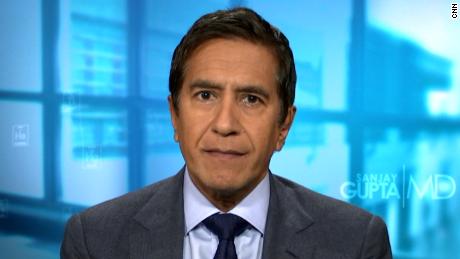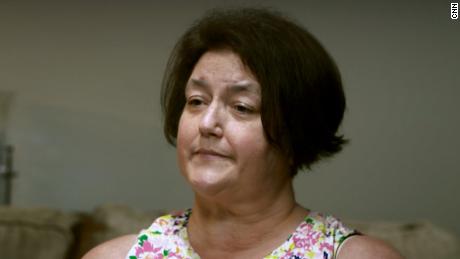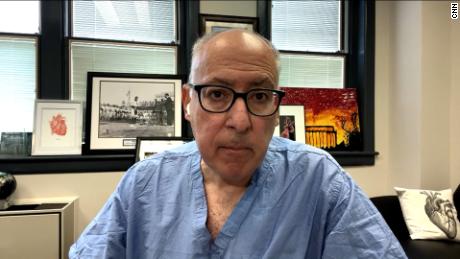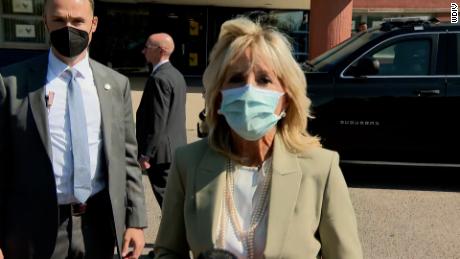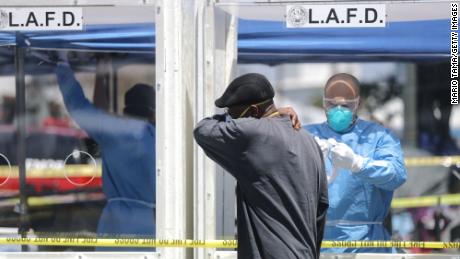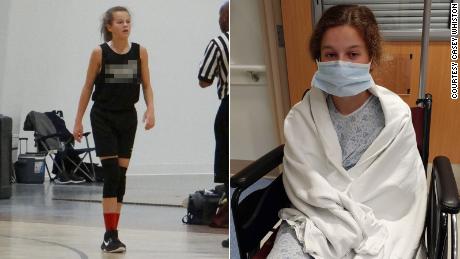(CNN)Dr. Anthony Fauci, the nation's top infectious disease expert,ŌĆ»hopes the latest data on a rising number of Covid-19 cases and projections of possibly many more deaths "jolt" the American public into reality, heŌĆ»told CNN's Jake Tapper on Monday.
Dozens of states are seeing an upward trend of new Covid-19 cases -- and the pandemic could get worse, as the latest forecast of a widely-used model projects another 181,000 deaths in the United States by February.
"I hope these numbers ... jolt the American public into the realization that we really cannot let this happen -- because it's on a trajectory of getting worse and worse. And that's the worst possible thing that can happen as we get into the cooler months," said Fauci, director of the National Institute of Allergy and Infectious Diseases.
Fauci says he is concerned some people think officials are asking for too much, like reimposing measures tied to running restaurants and businesses.
"We are not talking about shutting down. We're talking about simple public health measures, as simple as they sound, are really quite effective -- and that's what we say over and over again," he told CNN.
It's the same things you have heard before that can be effective -- wear a face covering, don't get too close to others, wash your hands often, don't take part in a large group, he said.
More of CNN's coronavirus coverage
And for the cooler months, still try to do things outside, he added. Experts fear that as people spend more time indoors, the virus will spread more widely.
"We don't have to do anything more complicated than that -- and you would have a major impact on preventing surges, or even turning surges around that are ongoing," Fauci said.
As of Monday, coronavirus has infected more than 7.7 million people and killed more than 215,000 in the United States, according to Johns Hopkins University.
The overall death toll could nearly double to about 400,000 by February, according to the University of Washington's Institute for Health Metrics and Evaluation.
Former CDC Director Dr. Richard Besser said it's up to all Americans to make sure grim projections don't become reality.
"What we do matters," he said. "If we follow the lead of CDC and do the things that are working around the globe, in terms of wearing masks and social distancing and washing hands and investigating cases, ensuring people have what they need to isolate and quarantine, we can have a very different trajectory and we can get this in control."
The trend is not just a US problem; the total number of cases reported worldwide has reached a record total each of the past four days, according to the World Health Organization.
31 states seeing more cases
Once again, most of the country is in trouble.
As of Monday, 31 states have reported more new Covid-19 cases this past week compared to the previous week, according to data from Johns Hopkins University.
And nine states reported record-high Covid-19 hospitalizations on Sunday, according to the Covid Tracking Project: Arkansas, Kansas, Missouri, Montana, Nebraska, North Dakota, Oklahoma, Wisconsin and Wyoming.
"These are extremely alarming trends, and there should be warning bells going off around the country," emergency medicine physician Dr. Leana Wen said.
"Some will say, 'Well look, we are having increasing numbers of cases because we're testing more.' But we also know that in more than 15 states, the test positivity rate is over 10% -- which means that we're not doing nearly enough testing."
On top of that, many people have no idea where they caught the virus.
"Many parts of the country are reporting that 50% or more of their cases cannot be traced back to any single infectious source -- which also means that there is a high level of community spread," Wen said.
"We know what's coming next ... we're going to get increasing numbers of hospitalizations," she said.
"Hospitals could again become overwhelmed. And then we're not just talking about patients with coronavirus who might be in trouble. It's also about other patients who might be coming in for heart attacks and strokes and car accidents who may find a situation that's really untenable."
No one is off the hook -- not even places that have improved
Several states, especially in the Northeast, have enjoyed much better success at fighting coronavirus after implementing strict and innovative ways to limit the virus' spread.
But residents of those states can't let their guard down, White House coronavirus task force coordinator Dr. Deborah Birx said.
"We're seeing those early suggestions here in the Northeast and what we wanted to make clear is the actions this time have to happen at the personal level, in our private homes, rather than just the public spaces," Birx said Friday at a briefing in Massachusetts.
She said people need to learn from the summer outbreaks in the South, where seemingly harmless gatherings contributed to spread of the virus.
"People let down their guard when they were with friends and family. And they took off their masks. And they share dinner, or they share drinks inside. And those become spreading events," Birx said.
WHO: Study showing virus can live 28 days on surfaces has limitations
Monday, the World Health Organization addressed a recent study that showed coronavirus could survive on surfaces for up to 28 days.
The study "looked at samples that had very high viral loads" and was not done in "real world conditions," WHO infectious disease epidemiologist Maria Van Kerkhove said.
"It was done in the dark, which means it didn't have any UV lights of what you would see in under normal real world type situations," she said.
"It found that the virus could remain viable for 28 days at 20 degrees Celsius (68 degrees Fahrenheit), and 24 hours at 40 degrees Celsius (104 degrees Fahrenheit)."
Van Kerkhove said while this experiment does not mimic real world conditions, WHO has looked into the study.
"We use this information to look at our disinfectants," Van Kerkhove said. "The good news is that this virus can be disinfected -- with disinfectants, with chlorine ... very, very quickly."
This pandemic is costing the US $16 trillion, experts estimate
The estimated cost of the pandemic in the United States could be more than $16 trillion, according to an article published Monday in the medical journal JAMA.
That's about 90% of the annual gross domestic product of the United States, the authors said.
The estimate is based off of the "optimistic assumption" that the pandemic will be substantially contained by the fall of 2021, wrote David Cutler, a Harvard University economics professor, and Lawrence Summers, president emeritus of Harvard University.
They estimate the combined costs of mortality, morbidity, mental health conditions and direct economic losses exceed those of conventional recessions and even the Iraq war -- and are more comparable to those of 50 years of global climate change.
Though there is no price that can be placed on a human life, the authors said economists have developed standard ways to measure these losses. Using a conservative value of $7 million per life, "the economic cost of premature deaths expected through the next year is estimated at $4.4 trillion," the article states.
The authors say the long-term complications for those who survive Covid-19 will cost $2.6 trillion for cases forecasted through the next year.
Increased investments in testing and contact tracing are worth it, Cutler and Summers said, noting the economic benefits could be 30 times greater than the cost.
"More generally, the immense financial loss from COVID-19 suggests a fundamental rethinking of government's role in pandemic preparation," the article states.


